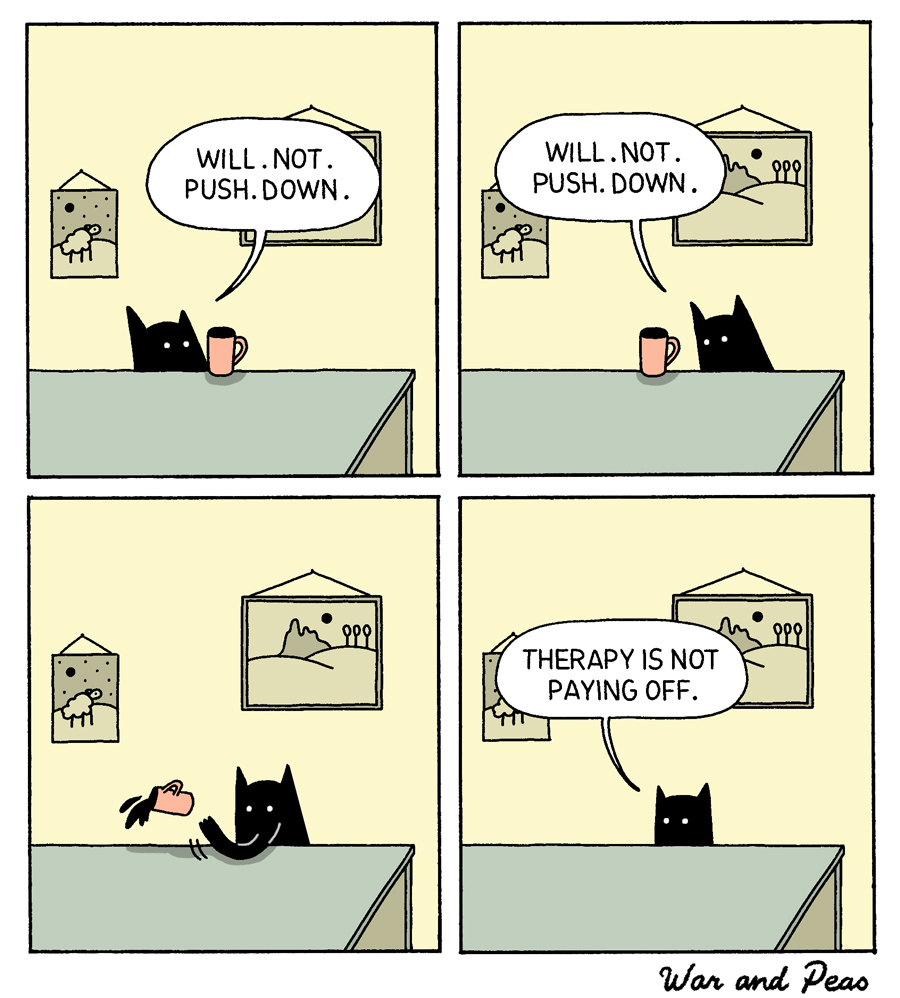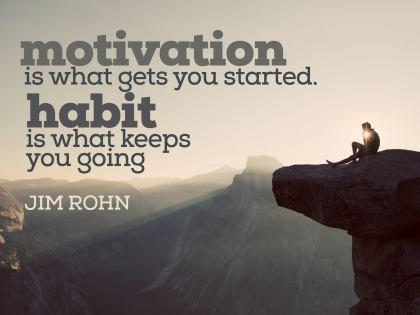
Habits aren’t just tasks we perform -they shape our identity and how the world sees us. But not all habits are created equal. The right ones boost our productivity and efficiency while others lead to unfavorable results. We must become conscious of them and get behind the wheel. These five steps will help you develop habits that lead to success on your own terms. (Estimated reading time: 6 minutes)
“We first make our habits, and then our habits make us.”
— John Dryden
Humans are creatures of habit. We find comfort in rituals that free us to focus on less predictable things. Routine gives us a feeling of security and control over our environments whether it be needing your morning cup of coffee before taking your dog for a walk or taking the same route to work and following a morning system of checking emails.
From a survival perspective, a predictable lifestyle makes sense. Basic needs, such as food, sleep, and safety are met through our daily practices. When we’re familiar with what we’re dealing with, we’ll be more attuned to anything out of the ordinary and feel capable of handling it.
Neuroscientists have studied our habit-loving ways, and it all comes down to the way our brains behave. Our brains form neural pathways – connections between neurons – that become stronger each time we repeat a task. When we perform enough repetitions, we no longer have to think about how it’s done.
When you first drive a car, it feels like you have to keep a lot of things in mind, but after you gain enough experience, it comes naturally. In this way, habits preserve our mental energy.

But here’s the tricky part; because we equate habits with comfort and security, we hold on to them, even the ones that aren’t good for us. If you’ve ever tried to break a bad habit, like smoking or eating too much sugar, you know that reasoning your way through it isn’t enough to change your ways. In theory, the process of breaking a bad habit sounds simple, but when you actually try doing it, it feels like you’re swimming upstream, fighting against the current.
If you’re struggling to transform an unhealthy habit, it’s essential to acknowledge that what you’re trying to do is not easy. The last thing you need is the self-deprecating voice of your inner critic minimizing your efforts to change.
Next, take a strategic approach. Instead of trying to break a habit, replace it with a different one that meets the same underlying need. For example, the anxiety-reducing effect of smoking can be met with a regular practice of meditation.
The process of changing habits takes time. We’ve all heard that it takes 21 days to create a new habit, but it turns out that this number is arbitrary, but still passed on by self-help gurus over the years.
New studies show that it can take anywhere from 18 to 254 days on average. In other words, it will take as long as it takes. The more focused and diligent we are, the faster we’ll grow into those habits.
But not all habits are created equal. The right ones boost our productivity and efficiency. With enough focused repetition, we can master any skill. Author Malcolm Gladwell said, “Practice isn’t the thing you do once you’re good. It’s the thing you do that makes you good.”
The truth is that success doesn’t happen overnight. It happens in tiny increments in the form of well-thought-out habits that we diligently practice on a regular basis.

Habits that lead to success are not always fun. They require discipline and restraint. If you want to get a six-pack, you have to eat healthy foods and have a regular workout routine.
If you want to start your own business, you have to find ways to raise capital, build revenue, and manage your admin duties. People who have achieved success in any area were successful in performing and executing the right habits.
The majority of people run on autopilot and follow the conventional rules they picked up from their family and culture. A strong need to fit in can influence us to develop habits that won’t necessarily lead to our heart’s desire. It’s only with the passage of time that we’ll see the impact of social conditioning on our lives, based on how dissatisfied we feel.
Our habits are an accurate predictor of future success. We must become conscious of them and get behind the wheel. These five steps will help you develop habits that lead to success on your own terms:
1. Pick habits that align with your goals and passions: Habits offer the opportunity for steady, incremental progress. That’s why you want to choose practices that take you where you want to go in the long-run. Ask yourself where you’d like to be 1, 5, or 10 years from now and why it’s important to you. Using your goals as targets, you’ll know in which direction to point your arrow. The momentum will come from your enthusiasm about reaching those milestones.
2. Make them simple and do-able: The popular phrase “dream big but start small” is a model approach to tackling goals. Society and the media, however, make us buy into the notion of overnight successes while ignoring all the hard work and monotony that comes with keeping to a routine. We want the instant gratification of immediate wins with a few easy steps, but that just isn’t how it works. Take a look at your goals and figure out how to make your habits achievable by considering your circumstances, energy levels, time, and resources.
3. Build a system and structure around your days: Lack of structure adds stress and a feeling of being ungrounded. We get caught up in the whirlwind of daily activities and find ourselves having to play catch-up and wing things. Whether you like to sketch out your system on paper (like I do) or use an app, consider the blocks of time you’ll need for each habit and the optimal time required to develop those routines.
For example, I’m an early riser and prefer to do my workouts in the morning, so I know that I’ll need to dedicate a couple of hours after I wake up. While flexibility is needed, structure gives a sense of balance and stability.
4. Review and adjust: There’s always a chance we’ll over or underestimate what we’re capable of accomplishing. The best way to know whether you have realistic goals is by checking in with yourself. If you’re feeling exhausted and burned out, you might have to either change a habit, replace it, or reduce the time you’re spending on it. Measure your improvements. While it’s okay if your progress is slow and steady, ensure you’re going in the right direction.
5. Stick with it and have faith in the process: When you’re in the middle of the nitty-gritty of getting things done, the path to success can feel like a long way off. It’s during these times that we need to exercise self-discipline and have faith in the process. Malcolm Gladwell writes about a concept of a “tipping point” which he describes as “the moment of critical mass, the threshold, the boiling point.”
If we stick with our habits, we’ll eventually get to that threshold where results become visible. It’s that moment when people notice you’ve lost weight or when they see how much your business has grown, it will mean you’ve made it.
Habits aren’t just tasks we perform. Habits are ways of living that shape our identity and how the world sees us. A writer has a habit of writing daily. A mother has the habit of checking in with their kids to make sure they’re taken care of. If we want to be successful, we’ll need to adopt habits that are success-driven. As Aristotle once said, “We are what we repeatedly do. Excellence, then, is not an act, but a habit.”
All my best on your journey.
Seline

Question for you: Are your current habits leading you toward success? If not, what do you need to change?
Did you like this post? Sign up below, and I’ll send you more awesome posts like this every week

For me personally, the hard part is sticking with it. I get frustrated easily. I feel like I am not doing well enough. I get bored or upset or feel like it’s not working. I know I give up too easily. But it is hard. It is so very hard at times. You have given me a push. I will keep trying and keeping trusting the process. Hopefully, things start to click soon!
I hear you Alexa! I’m very much like this. I constantly need motivation and encouragement. I am always pushing myself and allowing myself passes in order to keep motivated and moving forward the best I can. It’s a daily battle and I have been trying to understand this process.
All we can do is keep pushing and getting up when we fall….there is always tomorrow to try and do better! 🙂
I think a lot of people struggle with this Seline! I know I do. It is had. So very very very hard at times. But all we can do is just keep on keeping on. Every time we fall we have to get back up. For every step back we have to try and take two steps forward. It is a constants give and take. That is life. I guess maybe i have learned to accept it. I cant change it so why fight against it? I just try to roll with it and make the best of things.